Faina Epatcheva Vahaleva (
Born on May 15, 1916, in a mountainous area in the Russian city of Sverdlovsk (now Ekaterinburg), Vahaleva was first lady from 1978 to 1988, when Chiang Ching-kuo, the son of Chiang Kai-shek (蔣介石), served as Taiwan's president.
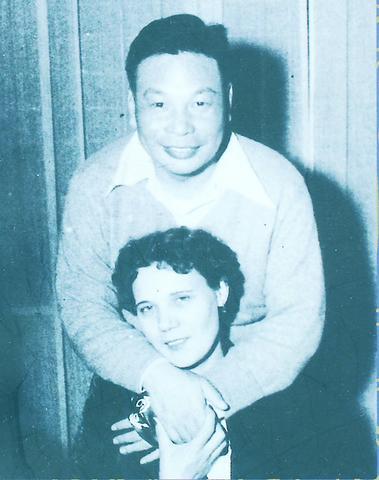
PHOTO: COURTESY OF CHINA TIMES PUBLISHING COMPANY
Though becoming a member of what was then China's most powerful family at a young age, Vahaleva had never attracted as much media spotlight as other members of the family. In the period of more than half-a-century since she set foot in Taiwan after Chiang Kai-shek's KMT government fled in 1949, the public's impression of the former first lady was ambivalent. The public knew that she was Chiang Ching-kuo's Russian wife and the mother of four children. But apart from that, her life and what kind of a person she was remained as mysterious as highly guarded intelligence secrets.
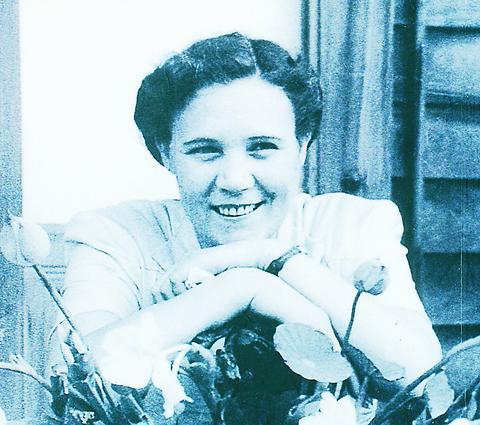
PHOTO: COURTESY OF CHINA TIMES PUBLISHING COMPANY
Unlike the lonesome, melancholy and feeble person that the public saw in her during her rare public appearances, young Vahaleva was extroverted, passionate and enjoyed outdoor activities. She was also an active and outspoken member of the Soviet Union's Communist Youth League.
Orphaned at young age, she was raised by her elder sister, Anna. After graduating from a training school for workers, she and her sister both landed jobs in the Ural Heavy Machinery Plant in 1932. In 1933, she became acquainted with Chiang Ching-kuo and they were married on March 15, 1935.
In October 1925, Chiang Ching-kuo went to study in Moscow at the age of 15. Chiang Kai-shek's countenance was believed to have been aimed at securing political interests and cementing ties with the Soviets. But as relations strained between Chiang Kai-shek and the Soviets, Chiang Ching-kuo's life in the communist country suffered.
The complexity of politics was beyond Vahaleva's control but she stood by Chiang Ching-kuo to endure the economic hardship, becoming his soul mate and only source of support in Russia. When the plant discharged Chiang Ching-kuo from his duties under the communists' order in September 1936, Vahaleva was, for six months in 1936 and 1937, the bread-winner of the family, supporting her husband and their son, Alan (
Following the Sian Incident (西安事變) of December 1936, Soviet leader Josef Stalin finally granted Chiang Ching-kuo his request to return to China.
Warmly received by Chiang Kai-shek and his wife Soong Mayling (宋美齡), Vahaleva was sent with Chiang Ching-kuo back to his hometown of Hsikou, Chekiang, to live with Chiang Ching-kuo's mother, Mao Fu-mei (毛福梅) and to learn Chinese. But because she was surrounded by people who spoke the local Ningbo dialect, she just learned to speak the dialect instead of Mandarin. Notwithstanding the language and cultural barriers, Vahaleva made efforts to adapt herself to her new role and the strange environment. She got along well with Mao but was not spoiled by comfort. Instead of relying on servants and maids, she insisted on doing the cooking and housework herself like traditional Chinese housewives. Their neighbors often saw her doing the family laundry or going shopping by bike.
Throughout Chiang Ching-kuo's decades-long political career, it was only during their time in southern Kiangsi that Vahaleva played a somewhat active part in Chiang Ching-kuo's public life.
In the spring of 1938, Chiang Ching-kuo was sent by his father to serve as an administrative officer in southern Kiangsi as part of his leadership training. He soon earned the reputation of having the audacity to challenge corrupt KMT officials and for hard work. He enjoyed mingling and exchanging views with young people. He often invited his colleagues and friends to his rather ordinary house where Vahaleva played hostess to the guests.
Chiang Ching-kuo, then young and energetic, was ambitious in pursuing his political career. As the positions he was assigned to were not yet sensitive in nature, he encouraged Vahaleva to assist with his job and she enjoyed engaging in the tasks to which Chiang Ching-kuo assigned her -- mostly related to women's and children's welfare.
But while Vahaleva's years in southern Kiangsi were some of the most colorful and fulfilling in her married life, she was deeply hurt by her husband's infidelity. Among Chiang Ching-kuo's numerous confirmed and unconfirmed extramarital relationships, one of the most noted was his affair with one of his assistants, Chang Ya-jo (章亞若). Chang gave birth to twin boys, John Chang (章孝嚴) and Chang Hsiao-tzu (章孝慈), in 1943.
Though the affair ended following the sudden and mysterious death of Chang Ya-jo in 1943, it nonetheless cast a shadow over the family for decades. Chiang Ching-kuo had never admitted any rumors concerning his much speculated extramarital relationships, and Vahaleva never publicly spelled out her feelings about the betrayal. But handling relations between the Chiang family and Chiang Ching-kuo's two illegitimate sons was a thorny issue for family for decades.
The way Vahaleva resigned herself to her husband's infidelities -- similar to how Chiang Ching-kuo's mother dealt with Chiang Kai-shek's countless extramarital relationships and eventual marriage with Soong -- exemplified how thoroughly she had internalized the traditional role of a Chinese wife.
More recently, media hype over the legal recognition of the Chang brothers as offspring of the Chiang family hurt Vahaleva.
Vahaleva's role as first lady was like no other in Taiwan's history. Partly because of the political sensitivity associated with her foreign origin and partly because of Chiang Ching-kuo's prohibition of her intervening in political affairs, Vahaleva never really performed the ceremonial role that a first lady has traditionally been assigned.
Furthermore, her stature as first lady paled even more when compared with the influence of her legendary mother-in-law, Madame Chiang. Soong Mei-ling's assertiveness and dominance both within the Chiang family and over Taiwan's political scene under the KMT's authoritarian regime was such that she became "the ever-lasting first lady."
But the lack of public exposure and fame didn't seem to bother Vahaleva much. She managed to repress her feelings for her homeland for decades and endured severing all ties with Russia. She was content to be an average housewife and surrounded by her husband and children.
Vahaleva's humble wish was shattered, however, by the death of Chiang Ching-kuo on Jan. 13, 1988, soon followed by the death of their three sons -- Alan in April 1989, Hsiao-wu (
With health problems worsening, Vahaleva became withdrawn and shut herself away in her empty Chihei residence in Taipei's suburban Taichih district.
Vahaleva's only daughter, Hsiao-chang (
In her own resilient and low-profile way, Vahaleva has served as a unique model for the women of the Chiang family -- to stand quietly and firmly by their husbands and sacrifice themselves for the family's sake -- just like what traditional Chinese society expects of a wife and a mother.
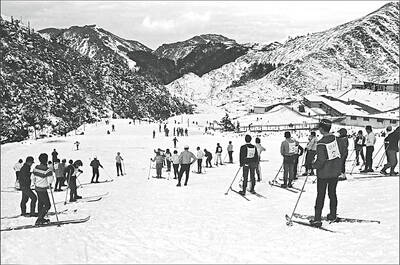
A strong continental cold air mass and abundant moisture bringing snow to mountains 3,000m and higher over the past few days are a reminder that more than 60 years ago Taiwan had an outdoor ski resort that gradually disappeared in part due to climate change. On Oct. 24, 2021, the National Development Council posted a series of photographs on Facebook recounting the days when Taiwan had a ski resort on Hehuanshan (合歡山) in Nantou County. More than 60 years ago, when developing a branch of the Central Cross-Island Highway, the government discovered that Hehuanshan, with an elevation of more than 3,100m,
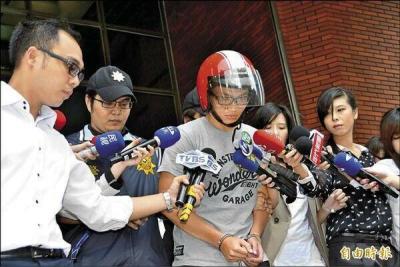
Death row inmate Huang Lin-kai (黃麟凱), who was convicted for the double murder of his former girlfriend and her mother, is to be executed at the Taipei Detention Center tonight, the Ministry of Justice announced. Huang, who was a military conscript at the time, was convicted for the rape and murder of his ex-girlfriend, surnamed Wang (王), and the murder of her mother, after breaking into their home on Oct. 1, 2013. Prosecutors cited anger over the breakup and a dispute about money as the motives behind the double homicide. This is the first time that Minister of Justice Cheng Ming-chien (鄭銘謙) has
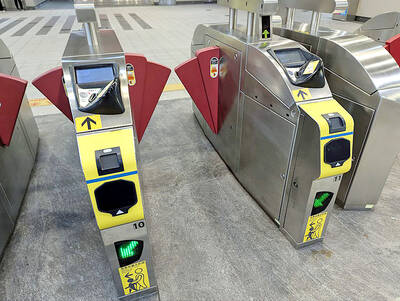
TRANSPORT CONVENIENCE: The new ticket gates would accept a variety of mobile payment methods, and buses would be installed with QR code readers for ease of use New ticketing gates for the Taipei metro system are expected to begin service in October, allowing users to swipe with cellphones and select credit cards partnered with Taipei Rapid Transit Corp (TRTC), the company said on Tuesday. TRTC said its gates in use are experiencing difficulty due to their age, as they were first installed in 2007. Maintenance is increasingly expensive and challenging as the manufacturing of components is halted or becoming harder to find, the company said. Currently, the gates only accept EasyCard, iPass and electronic icash tickets, or one-time-use tickets purchased at kiosks, the company said. Since 2023, the company said it
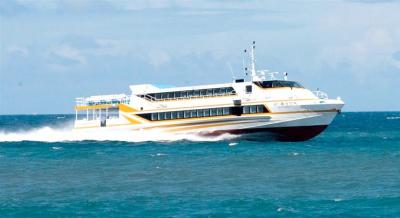
Ferry operators are planning to provide a total of 1,429 journeys between Taiwan proper and its offshore islands to meet increased travel demand during the upcoming Lunar New Year holiday, the Maritime and Port Bureau said yesterday. The available number of ferry journeys on eight routes from Saturday next week to Feb. 2 is expected to meet a maximum transport capacity of 289,414 passengers, the bureau said in a news release. Meanwhile, a total of 396 journeys on the "small three links," which are direct ferries connecting Taiwan's Kinmen and Lienchiang counties with China's Fujian Province, are also being planned to accommodate